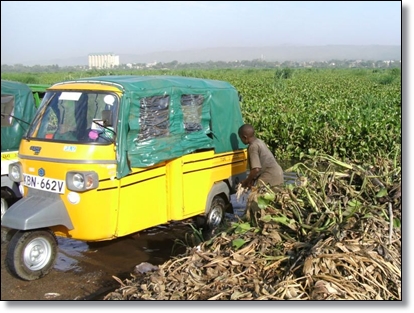Lake Victoria: Threatened with Extinction?
 |
|
Lake Victoria pollution from motor wash and hyacinth Photo Courtesy |
Kenya’s Mau Forest is an important catchment area of numerous lakes such as Lake Victoria, Lake NaKuru, Lake Baringo, Lake Natron and Lake Naivasha, among others. An average of 30 million Kenyans depend on its water sources. The forest’s cooling action and carbon storage moderates the regional climate.
Deforestation in Mau poses a great danger to ecosystems that depend on it. Lake Victoria may no longer play host to its two hundred fish species. The lake is highly polluted by both natural and chemical components.
“The greatest threat to lake Victoria is pollution, the inorganic farming practices from the catchment area and pesticides get in the lake when there is run off,” says Moses Owour Oyier, programs officer at Osienala (acronym of friends of lake Victoria in Dholuo language).
He opines that Kericho tea zones, Kisii highlands and waste from Kagera River in Rwanda highly contribute to the pollution of the Lake. Osienala promotes environmental consciousness through activities with the community and educational institutions. It also helps the community organize and maintain their resources. He also confirms that change in weather patterns has also caught up with the entire ecosystem through floods, increased evaporation, change in fish species and a general reduction in the water levels. The Nile perch, a predator fish, is threatened with extinction for scarcity of (Athi elephant Shout Fish - Mormyrus Tenuirostris) the fish species that it feeds on are facing extinction.
Invasive species are also a threat to the lake. The water hyacinth which was introduced to the lake makes it impossible for navigation and also fishing. Algae are also becoming a menace at the lake.
“A certain beetle was introduced in the lake to combat the spread of hyacinth but was not effective, for it refused to feed on the hyacinth,” Moses adds. This was one of the biological methods that were suggested by scientists to curb the spread of the invasive species. The weed is however being pulled out manually.
At Dunga beach, six kilometers from Kisumu town, things are different. Boatmen idle on the beach with their boats. Sacks of charcoal that are believed to be from Uganda are a booming business here.
“Fish business is no longer a priority here,” Mercy Anyango an elderly woman who lives in Dunga tells me.
Michael Owala who started staying in Kisumu in 1985, a fisherman, confirms to me that he has witnessed a drastic change at the lake. The waters have reduced; fish is no longer in plenty as it used to be.
“In Dunga beach, people are becoming poorer. They used to earn their livelihood from fishing. This no longer happens,” he laments.
Levels of unemployment are high and people can no longer benefit from the resource they have. Many have resorted to selling their pieces of land along the beach to investors who are flocking the area. Achieng Ochola, a fish monger at a famous Market, Kibuye, says that she no longer enjoys fish business which she has done for the last fifteen years.
” The cost of fish is so dear. The lake is also very dirty, we get sick often from water borne diseases,” she laments.
Population pressure along the lake is also a major threat. Upstream, farmers are contributing to the pollution of the lake through agro-pesticide use. Chris Owala from Community Initiative Action Group Kenya (CIAG) who champions for justice, governance human rights and sustainable development tells me that CIAG is concerned with the governance of the lake resources. CIAG advocates for the protection of the riparian land and promotion of land rights of the indigenous groups within the region. There are special cases like the widows who are not able to own land and struggle to survive and have only the lake resource to survive on. Once the Lake is destroyed, they will have nowhere to turn to.
As one drives towards Kisumu International Airport, a terrible stench from Kisat River fills the air around that area. Raw discharge from the Kisumu town council treatment plant is offloaded into Lake Victoria.
For Kenya to benefit from the green economy status, more needs to be done on its resources that are facing serious environmental challenges. Lake Victoria is just among many ecosystems that are suffering in the hands of the people. If no measures are taken towards saving the lake, the entire region that benefits from the lake will be affected.
By Mary Mwendwa
Transworld Radio
